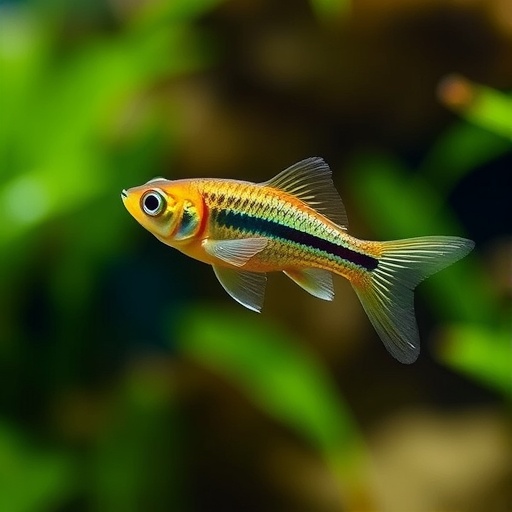Recent research has unveiled alarming insights into the effects of the herbicide Roundup WG® on aquatic life, specifically focusing on zebrafish (Danio rerio). Conducted by a team of scientists led by C.E. Davico, this study delves into sex-specific hepatotoxicity, emphasizing that the environmental ramifications of widely used agrochemicals can profoundly affect different species and sexes. This pivotal research highlights the urgent need for deeper investigation into how agricultural chemistries are altering aquatic ecosystems.
Zebrafish have long been used as a model organism in environmental toxicology due to their genetic similarity to humans and the transparency of their embryos, which allows for real-time monitoring of physiological changes. In this groundbreaking study, the aim was to assess whether male and female zebrafish exhibit differing levels of liver toxicity when exposed to Roundup WG®, a glyphosate-based herbicide commonly used in agriculture. The findings reveal a concerning disparity, sparking discussions about sex-differentiated responses to chemical exposures.
The primary method used in the study included controlled exposure to varying concentrations of Roundup WG® over a specified period. Researchers meticulously monitored the health of the zebrafish, measuring liver enzymes and other biomarkers indicative of liver function. The results demonstrated that female zebrafish experienced significant hepatotoxic effects at lower concentrations in comparison to their male counterparts, a finding that adds a significant layer of complexity to our understanding of how pollutants affect different genders in aquatic species.
Moreover, the study analyzed potential mechanisms behind this phenomenon, suggesting that hormonal differences between male and female zebrafish might play a crucial role in mediating their responses to toxins. This raises critical questions about hormone-related vulnerabilities in aquatic species due to environmental pollutants, urging scientists to reevaluate the implications of chemical exposures in a gender-specific context.
In today’s era of agricultural expansion, the increasing use of glyphosate raises environmental concerns beyond just immediate agricultural benefits. The study underscores the implications of herbicide runoff into aquatic habitats, where it can disrupt the endocrine systems of aquatic organisms, leading to health complications and possibly affecting biodiversity. Findings from this research serve not only to inform regulatory assessments but also to provoke broader discussions about sustainable farming practices.
The authors call for a reevaluation of pesticide regulations to incorporate sex-specific studies on aquatic organisms. Currently, many assessments do not differentiate based on sex, which could lead to overlooked vulnerabilities that may undermine aquatic populations. Regulatory bodies must recognize that the interaction between chemicals and living organisms is far more intricate than a one-size-fits-all approach suggests.
In addition to its ecological implications, the findings from this research could hold relevance for human health as well. As fish are a staple in many diets worldwide, understanding how environmental chemicals affect these organisms might give insight into potential risks for human consumers. The study invites further inquiry into how chemicals bioaccumulate in the food chain and what this means for public health.
Furthermore, the study provides a stark reminder of the interconnectedness of ecosystems. Contaminants introduced into one habitat can have far-reaching effects on the entire aquatic food web. With zebrafish often serving as a protein source for larger predators, effects from Roundup WG® could propagate upwards, emphasizing the need for a holistic view of environmental health when considering agricultural practices.
Another important aspect highlighted in this research is the potential for synergistic effects from multiple environmental stressors. Zebrafish living in environments contaminated with various pollutants may not only be dealing with Roundup WG® but also other chemicals that could exacerbate its impacts. This aspect underscores the reality that many aquatic organisms face a cocktail of stressors rather than isolated exposures, which complicates risk assessments.
The study also illustrates the significance of research that focuses on non-target species in agricultural impact studies. While herbicide efficacy on target pests is often prioritized, the consequences for non-target aquatic organisms must be given equal attention. Understanding the broader ecological impacts of agricultural chemicals is vital for sustainable practices that protect both human interests and wildlife.
Ultimately, this research by Davico and colleagues presents a clarion call for more comprehensive environmental monitoring and assessment protocols. By integrating sex-specific studies into evaluations of chemical exposures, regulatory agencies may offer better protection for vulnerable species, ensuring the integrity of ecosystems. Such an approach could also foster a deeper understanding of habitat health, thereby promoting biodiversity conservation.
As the world increasingly grapples with the consequences of chemical dependencies in agriculture, studies like this serve as a vital lens into the complex dynamics of environmental health. They remind us that every species has a role in our ecosystems, and we must strive to protect these intricate systems from the potential damage caused by human activities. The urgency of the findings cannot be overstated as they highlight that the future of both wildlife and human populations is inextricably linked to the stewardship of our natural resources.
In closing, as researchers and policymakers navigate the complexities of agricultural practices, it remains crucial to prioritize studies that unveil the subtleties of ecological interactions in the face of chemical exposure. The work presented in this study sets a significant precedent, advocating for the preservation of both aquatic organisms and the environments they inhabit. Only through such diligent research and its implementation into regulatory frameworks can we hope to ensure the sustainability of our ecosystems for generations to come.
Subject of Research: Environmental impact of Roundup WG® on zebrafish liver toxicity
Article Title: Sex-specific hepatotoxicity in zebrafish (Danio rerio) induced by Roundup WG® exposure.
Article References:
Davico, C.E., de Melo, M.S., Pereira, A.G. et al. Sex-specific hepatotoxicity in zebrafish (Danio rerio) induced by Roundup WG® exposure.
Environ Sci Pollut Res (2025). https://doi.org/10.1007/s11356-025-36894-3
Image Credits: AI Generated
DOI: 10.1007/s11356-025-36894-3
Keywords: Roundup WG®, zebrafish, hepatotoxicity, environmental impact, agrochemicals, endocrine disruption.




